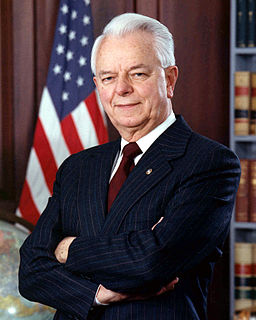A Quote by Rand Paul
The separation of powers is about legislative powers. It isn't about discussion or words.
Quote Topics
Related Quotes
I believe in the separation of powers. If a judge crosses the line between interpreting and making the law, he has crossed the line supporting his legitimate authority from the legislative branch's authority. Now, to me that's a very serious matter if we believe, as America's founders, did that the separation of powers - not just in theory or in textbook but in practice in the actual functioning of government - is the linchpin of limited government and liberty.
The constitution has divided the powers of government into three branches, Legislative, Executive and Judiciary, lodging each with a distinct magistracy. The Legislative it has given completely to the Senate and House of Representatives. It has declared that the Executive powers shall be vested in the President, submitting special articles of it to a negative by the Senate, and it has vested the Judiciary power in the courts of justice, with certain exceptions also in favor of the Senate.
When great powers fade, as they inevitably must, it's normally for one of two reasons. Some powers exhaust themselves through overreach abroad, underinvestment at home, or a mixture of the two. This was the case for the Soviet Union. Other powers lose their privileged position with the emergence of new, stronger powers.
The British government had not engaged in any serious actual oppression of the colonies before 1774, but it had claimed powers not granted by the governed, powers that made oppression possible, powers that it began to exercise in 1774 in response to colonial denial of them. The Revolution came about not to overthrow tyranny, but to prevent it.
If the federal government has the exclusive right to judge the extent of its own powers, warned the Kentucky and Virginia resolutions' authors (James Madison and Thomas Jefferson, respectively), it will continue to grow - regardless of elections, the separation of powers, and other much-touted limits on government power.
































